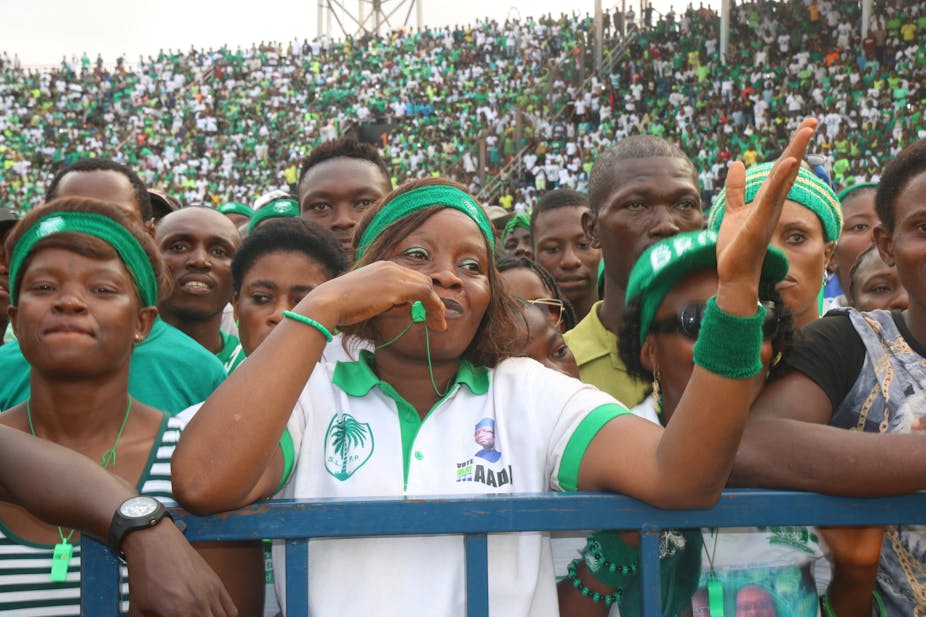Sierra Leone recently held peaceful presidential elections. But you would not know it from the media, which suggested that the country was frequently overwhelmed by violence during this period.
The first round results were announced in mid-March, which concluded that no single party had the required majority. The results of the run off between the two main parties, the incumbent All People’s Congress and the opposition Sierra Leone People’s Party, were announced on 4 April.
The opposition party won, making it only the second time the country has had a peaceful transition between parties since the end of the civil war in 2002. It’s also the fourth time since the end of the war a peaceful democratic election has taken place in the country.
During the campaigning period between the two elections there were reports of violence, “tribal rhetoric” and ritual killings across the country.
But even after the elections were finished and power had been successfully transferred, a New York Times article focused on violence, even alluding to “ethnic cleansing”. This was a particularly absurd phrase to use given that there has never been any significant ethnic violence in Sierra Leone. Even the civil war didn’t have an overt ethnic dimension.
Over the years, simplistic narratives about Sierra Leone have made the country’s name practically synonymous with violence. In popular culture, films like Blood Diamond and memoirs such as Ishmael Beah’s A Long Way Gone have offered portrayals of Sierra Leone as extremely violent. More recently, the media has focused on the country’s struggles with the Ebola epidemic and the August 2017 mudslide. These stories project Sierra Leone as both the helpless victim, and the negligent perpetrator.
I am not suggesting that issues of violence should not be researched or reported, nor is it to dismiss the actual social issues in Sierra Leone, which I have been researching for the past six years. Rather, it’s to caution against the oversimplification of complex issues. And to highlight the fact that the media ignores positive stories and developments which are now commonplace in the country.
During the election period I was conducting research in Freetown with market women, trying to understand their association with politics. Freetown has very mixed political affiliations but people converse and debate peacefully. You may hear raised, impassioned voices, but the vast majority of people did not witness or participate in violent acts.
In market settings, people who voted for opposing parties worked side by side, laughing and making fun of one another. But for many Sierra Leoneans, the election was just one event, occurring in the background. Their real concerns were about rising food prices, slow sales and for street traders, being removed from the streets. The real issues people discussed were in relation to their livelihoods, concerns of violence were secondary.
Not just what, but how
But it’s not simply a question of balance between positive and negative news. It’s also about the language that’s used. Articles using terms like rituals and tribalism are perpetuating neo-colonial imagery that’s not representative of the place or its people. Concepts, like rituals, carry very different meanings for an international audience.
Rituals conducted in Sierra Leone are part of a very complex social system that involves secret societies, witchcraft and chieftaincy structures, that ultimately inform the national political landscape. These interactions are, however, embedded in a very particular way of thinking that take time to explain. They do not mean the same to people reading these stories in Europe or the US.
The word “tribalism” should also be taken with a grain of salt, in large part because it’s an inaccurate way of discussing Sierra Leonean politics. When Sierra Leoneans say “tribalism”, it’s most often shorthand for “regionalism”, referring to the North-South divide between the two main political parties: the Northern-based APC (often linked to the 35% Temne population) and the Southern-based SLPP (associated with the 31% Mende population).
But even these distinctions are tenuous. Sierra Leone has 16 ethnic groups scattered across the country, none of which have a firm affiliation to one political party. In addition, people of different ethnic groups routinely inter-marry. For example, the APC presidential candidate has a Temne father, a Loko mother and is married to a Mende and so, as many Sierra Leoneans pointed out to me just before the run off: there is actually no such thing as tribalism in Sierra Leone.
Indeed, there have been violent skirmishes but these are neither systematic, nor do they really convey what’s happening: these incidents are about political party affiliations, not tribes.
Long term impact
By writing these stories, both journalists and researchers convey particular imagery and condone the use of particular language as an acceptable way of speaking about Sierra Leone, and Africa. They naively hope audiences will “know better” and realise that violence, rituals and tribal rhetoric doesn’t sum it all up. But this is not what happens.
If these stories are going to be told, authors have a duty of care to particular places. They need to think about how they are being presented, the long-term impact of the language being used and the role they play, both as writers and readers who fall for click bait, in perpetuating neo-colonial narratives about Sierra Leone, and the continent.

